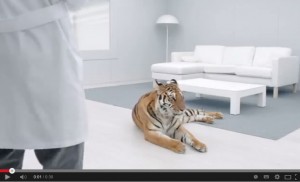 Hay agencias y empresas que no aprenden. El año pasado, cuando salió el anuncio Bosch Relaxx Prosilence (http://adnimalsfree.org/denunciamos-caso67) protagonizada por un tigre, nos pusimos en contacto tanto con la agencia responsable – I love Remo – como con Bosch España, para darles a conocer todas las problemáticas del caso. Les enviamos mails, cartas físicas, hicimos llegar a sus oficinas nuestro dossier “Los Animales no venden” y…no recibimos ni una sola respuesta. Ni una pequeña muestra de interés o de preocupación. Solo en Facebook, donde algunos de nuestros seguidores comentaron el anuncio indicando que ese tigre jamás hubiera tenido que estar allí, desde Bosch España contestaron afirmando que se trataba de un animal muy feliz que venía de un centro de rescate donde le habían salvado de muerte segura…
Hay agencias y empresas que no aprenden. El año pasado, cuando salió el anuncio Bosch Relaxx Prosilence (http://adnimalsfree.org/denunciamos-caso67) protagonizada por un tigre, nos pusimos en contacto tanto con la agencia responsable – I love Remo – como con Bosch España, para darles a conocer todas las problemáticas del caso. Les enviamos mails, cartas físicas, hicimos llegar a sus oficinas nuestro dossier “Los Animales no venden” y…no recibimos ni una sola respuesta. Ni una pequeña muestra de interés o de preocupación. Solo en Facebook, donde algunos de nuestros seguidores comentaron el anuncio indicando que ese tigre jamás hubiera tenido que estar allí, desde Bosch España contestaron afirmando que se trataba de un animal muy feliz que venía de un centro de rescate donde le habían salvado de muerte segura…
Solo que las cosas no están exactamente así, ya que como muchos ya sabréis, la tigresa en cuestión es Noa, “propiedad” de la empresa Fauna y Acción (que no es un centro de rescate, sino una empresa que cría animales con fines de lucro), cuyos padres fueron aparejados específicamente para “obtener” a un animal que pudiera ser entrenado y utilizado en publicidad, y que fue desungulada (http://adnimalsfree.org/blog/desungulacion-el-secreto-mejor-guardado-de-los-entrenadores-de-grandes-felinos/) para que resultara menos peligroso trabajar con ella. Tanto Noa como sus padres viven en pequeñas jaulas que carecen de enriquecimiento ambiental.
Pero a pesar de haber sido informados de todo esto, Bosch y I love Remo han vuelto a sacar un nuevo anuncio que tiene como protagonista al mismo animal: https://www.youtube.com/watch?v=PpIMA_qfKDw&list=UUM-ZsGTfKpbHySWvZYqZQ8w
Así que, llegados a este punto, necesitamos toda vuestra ayuda para pedir directamente a Bosch International que deje de explotar animales para sus anuncios. Os dejamos a continuación un mail tipo que podéis hacer llegar a la responsable de prensa de la empresa al mail: comunicacion.corporativa@bshg.com
Comentarios en Facebook y tweets también serán de gran ayuda…¡muchas gracias a todos desde ya!
“Dear Sirs,
I am addressing to you concerning your advertising campaigns Bosch Relaxx Prosilence and Bosch butterfly (https://www.youtube.com/watch?v=RM6ZvWDoik4 ; https://www.youtube.com/watch?v=PpIMA_qfKDw&list=UUM-ZsGTfKpbHySWvZYqZQ8w)
Wild animals used in the audiovisual sector live in unnatural environments and are forced to behave in ways that are completely improper of their species. This is very stressful for the animals and can have terrible consequences on their psychological and physical health.
Although at first glance it may not be evident, these animals suffer from fear, anxiety and stereotyped behaviors because of the stress. Many of them have to be mutilated in order to be safer to work with: Noa for example, the animal that stars in your commercials – was declawed, that means she had the last bone of each toe amputated: if performed on a human being, it would be like cutting off each finger at the last knuckle, and this kind of operation will have serious consequences – both psychological and physical – for the animal (here you can see how a mountain lion ended up because of this operation: https://www.youtube.com/watch?v=0NTTK_sGhyY).
Furthermore, Noa lives in a cage deprived of environmental enrichment and is trained by keeping her in a permanent state of hunger. Her parents no longer get out of their cages since, as it happens with many wild animals used in this industry and as it probably will happen with Noa, when they got too big and strong it was no longer possible (and safe) to interact with them.
Although Fauna y Acción, the company that owns Noa, claims to be a rescue center, please be informed that no real sanctuary would ever breed wild animals in captivity to exploit them for economic reasons and that they actually work with different animals belonging to circuses. A real rescue center wouldn’t keep their animals in tiny cages either and wouldn’t ask them to carry out any kind of unnatural behaviors and tricks.
Scientific studies also show that the use of an endangered animal (such as tigers, one of the most threatened species of our planet) in movies and advertising offers the public an incorrect perception on their state, leading people to think that, if they are on TV, they just can’t be threatened with extinction.
You can find more information on this subject on the web: http://en.adnimalsfree.org/
I am looking forward to hearing from you and I hope you will decide to stop using wild animals in your future advertisings.
Kind regards”


Un comentario en “Ayudanos a pedir a BOSCH que deje de explotar animales”
Los comentarios están cerrados.